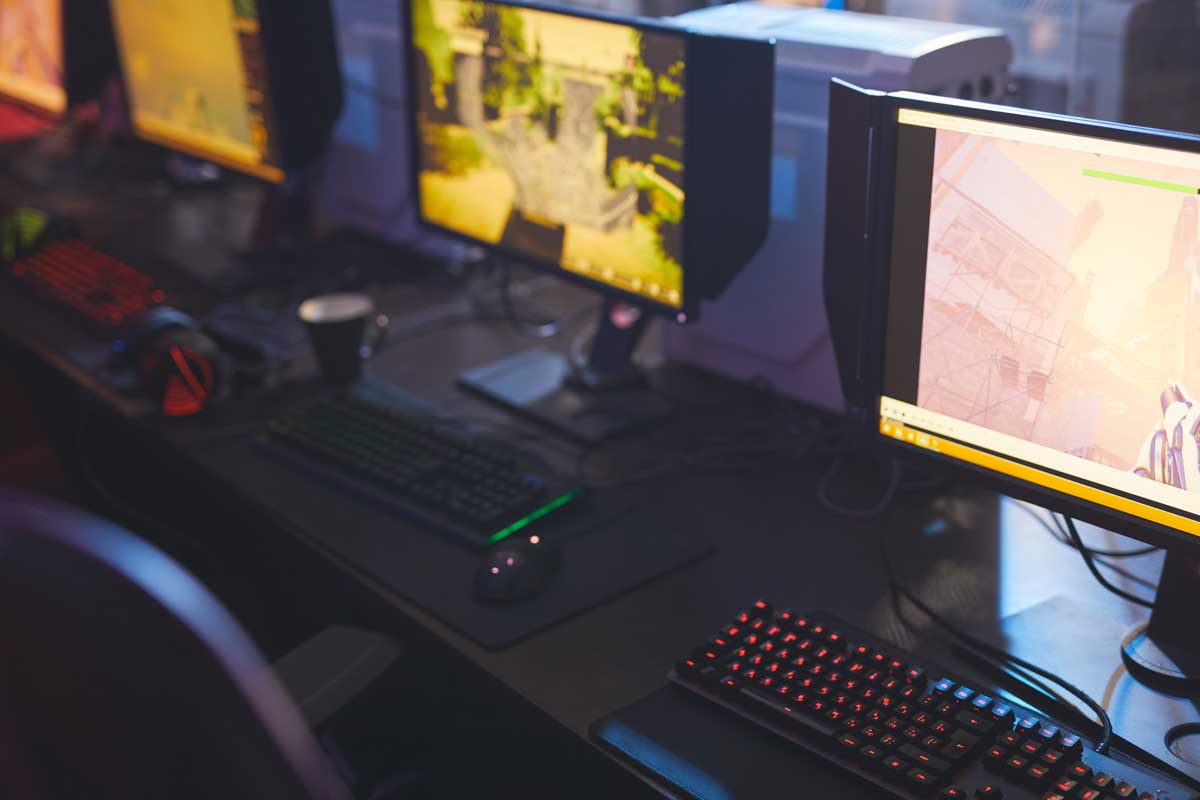 Image: SeventyFour, (Motion Array)
Image: SeventyFour, (Motion Array)
Why Esports is Popular?
In recent years, esports, the world of competitive gaming, has undergone a meteoric rise in popularity, captivating millions of players and spectators globally.
From massive tournaments filling stadiums to online streams amassing millions of views, esports has firmly established itself as a dominant force in the entertainment industry.
But what exactly is it that makes esports so popular? In this analysis, we will delve deeper into the multifaceted reasons behind the immense popularity of esports, addressing common questions and shedding light on its widespread appeal.
The Appeal of Esports
1. Accessibility:
Esports boasts unparalleled accessibility, making it a welcoming space for enthusiasts of all backgrounds. Unlike traditional sports, which often require physical prowess and access to specific facilities, esports can be enjoyed by anyone with a gaming device and an internet connection.
Whether you're a seasoned gamer or a casual player, the barrier to entry is relatively low, allowing individuals from diverse demographics to participate and compete on equal footing. This inclusivity made competitive gaming more accessible to everyone, creating a feeling of community and belonging among players all over the world.
2. Global Community:
Esports transcends geographical boundaries, connecting individuals from across the globe through a shared passion for gaming. Online platforms, social media, and streaming services serve as hubs where players and fans converge, forming vibrant communities that span continents and cultures.
Regardless of nationality or language, esports enthusiasts unite to celebrate their favorite games, share strategies, and forge lasting friendships.
The global camaraderie has played a pivotal role in fueling the growth of esports, transforming it into a truly international phenomenon.
3. Spectator Experience:
Esports offers an immersive and captivating spectator experience, blending the thrill of live competition with the entertainment value of video games.
Professional players showcase their skills in games ranging from strategy-based titles like League of Legends and Dota 2 to fast-paced shooters like Counter-Strike: Global Offensive and Overwatch.
Tournaments feature high-stakes matches, epic showdowns, and jaw-dropping displays of skill that keep viewers on the edge of their seats.
Moreover, professional commentary, expert analysis, and high-quality production enhance the viewing experience, providing audiences with insights and entertainment comparable to traditional sports broadcasts.
4. Diverse Game Selection:
One of the strengths of esports lies in its diverse array of games, catering to a wide spectrum of interests and preferences. Among the most popular esports titles are:
- League of Legends: A multiplayer online battle arena (MOBA) game that pits teams of players against each other in strategic, fast-paced battles.
- Dota 2: Another MOBA game known for its complexity and depth, where teams compete to destroy the enemy team's base.
- Counter-Strike: Global Offensive (CS:GO): A tactical first-person shooter game where teams of terrorists and counter-terrorists battle in objective-based game modes.
- Overwatch: A team-based multiplayer first-person shooter game featuring a diverse cast of heroes with unique abilities, competing in objective-based matches.
These games, among others, offer engaging gameplay, compelling narratives, and competitive environments that appeal to players and spectators alike.
This versatility ensures that esports remains engaging and relevant to players of all ages and skill levels, fostering a dynamic and inclusive gaming ecosystem that continues to evolve and expand.
Frequently Asked Questions
Are esports considered real sports?
While there is ongoing debate surrounding the classification of esports as traditional sports, there is no denying the skill, dedication, and competitive spirit exhibited by professional players. Esports competitions require strategic thinking, teamwork, and reflexes akin to traditional sports, earning them recognition as legitimate forms of competition.
Can anyone become a professional esports player?
While becoming a professional esports player requires talent, dedication, and hard work, it is not limited to a select few. With the right training, practice, and opportunities, aspiring players can hone their skills and compete at the highest levels. Institutions like VANAS Online Animation School offer specialized programs designed to equip individuals with the knowledge and skills needed to pursue a career in esports.
How can I get involved in esports?
Getting involved in esports can be as simple as playing your favorite games with friends or watching tournaments online. If you're interested in taking it a step further, you can join local gaming communities, participate in online competitions, or explore educational and training programs tailored to esports-related fields.
VANAS Online Animation School: Training Esports Enthusiasts
As the popularity of esports continues to soar, the demand for skilled professionals in areas such as game design, animation, and esports management is on the rise.
VANAS Online Animation School recognizes the potential of esports as a career path and offers specialized programs designed to equip students with the knowledge and skills needed to succeed in this exciting industry.
Whether you're passionate about game development, graphic design, or esports management, VANAS provides comprehensive training and support to help you turn your passion for gaming into a fulfilling career.
Wrapping up
The popularity of esports can be attributed to its accessibility, global appeal, engaging spectator experience, and diverse game selection. As esports continues to evolve and grow, it offers endless opportunities for players, fans, and industry professionals alike.
Whether you're a seasoned gamer or new to the world of esports, there's never been a better time to join the excitement and be a part of this thriving community.
Through education, innovation, and collaboration, we can continue to elevate esports and unlock its full potential as a global phenomenon.







